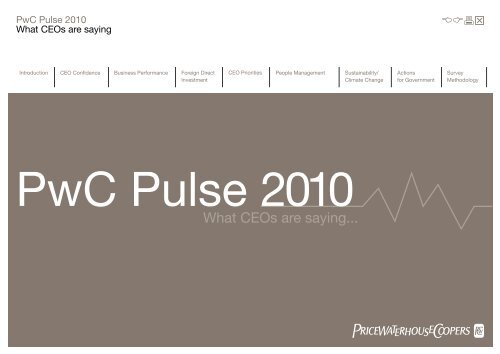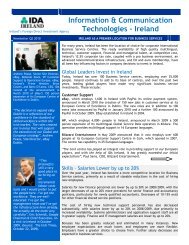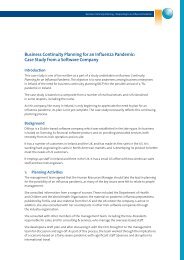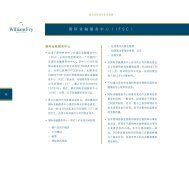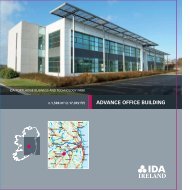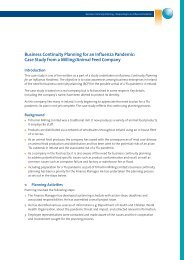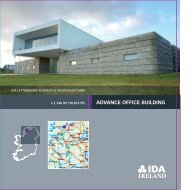Please click here to view the pdf associated with this ... - IDA Ireland
Please click here to view the pdf associated with this ... - IDA Ireland
Please click here to view the pdf associated with this ... - IDA Ireland
- No tags were found...
Create successful ePaper yourself
Turn your PDF publications into a flip-book with our unique Google optimized e-Paper software.
PwC Pulse 2010What CEOs are sayingIntroductionCEO Confidence Business Performance Foreign DirectInvestmentCEO Priorities People Management Sustainability/Climate ChangeActionsfor GovernmentSurveyMethodologyPwC Pulse 2010BusinessPost crisis business Role of government Climate change Business readinessbarometerchallengesindexWhat CEOs are saying...PricewaterhouseCoopers Pulse 2010 1
PwC Pulse 2010What CEOs are sayingIntroductionCEO Confidence Business Performance Foreign DirectInvestmentCEO Priorities People Management Sustainability/Climate ChangeActionsfor GovernmentSurveyMethodologyContentsSection 1 Introduction 03Section 2 CEO Confidence 04Section 3 Business Performance 06Section 4 Foreign Direct Investment 07Section 5 CEO Priorities 09Section 6 People Management 11Section 7 Sustainability/Climate Change 12Section 8 Actions for Government 14Section 9 Survey Methodology 15PricewaterhouseCoopers Pulse 2010 2
PwC Pulse 2010What CEOs are sayingIntroductionCEO Confidence Business Performance Foreign DirectInvestmentCEO Priorities People Management Sustainability/Climate ChangeActionsfor GovernmentSurveyMethodologySome glimmers ofconfidence returningCautious optimism is<strong>the</strong> single key highlightemerging from <strong>the</strong> PwC2010 CEO Pulse survey.The survey shows thatconfidence is returning.Nearly a third (29%) ofIrish business leadersare favourable about<strong>the</strong> outlook for <strong>the</strong> Irisheconomy compared<strong>to</strong> just 3% last year.However, ano<strong>the</strong>r third(31%) are unfavourableabout <strong>the</strong> future outlook,demonstrating continuinguncertainty in a difficul<strong>to</strong>perating environmentfor some. 40% see nochange in <strong>the</strong> economyover <strong>the</strong> next 12 months.“One in five expect <strong>Ireland</strong>'s economy <strong>to</strong>return <strong>to</strong> growth <strong>this</strong> year, while half expect<strong>this</strong> recovering in 2011.”Chart 1:Favourable outlook trends for <strong>the</strong> Irish economy2007 - 201080%Chart 2:Outlook for <strong>the</strong> Irish economy for <strong>the</strong> next 12 monthsChart 3:When will <strong>the</strong> Irish economy return <strong>to</strong> growth?60%40%20%0%PricewaterhouseCoopers Pulse 2010 4
PwC Pulse 2010What CEOs are sayingIntroductionCEO Confidence Business Performance Foreign DirectInvestmentCEO Priorities People Management Sustainability/Climate ChangeActionsfor GovernmentSurveyMethodologyCosts and finance still<strong>to</strong>p of mindFollowing significantcost-cutting andrestructuring over <strong>the</strong>last year, continuing<strong>to</strong> keep a check oncosts and access <strong>to</strong>available finance are<strong>to</strong>p-of-mind for economicrecovery. For example,Irish CEOs feel that<strong>the</strong> <strong>to</strong>p three fac<strong>to</strong>rscritical for <strong>Ireland</strong>’seconomic recoveryare reinstatement oflost competitiveness(68%), improvement in<strong>the</strong> flow of credit (61%)and developing andcommunicating a clearrecovery plan (57%) for<strong>the</strong> country. While muchwork has been done andpain has been taken in<strong>the</strong>se areas, <strong>the</strong> surveysuggests more needs <strong>to</strong>be done.O<strong>the</strong>r areas that needtackling are repositioning<strong>Ireland</strong> as a location-ofchoicefor foreign directinvestment; nurturingand incentivising ourindigenous exportingindustry and up-skillingour workforce.“Competitiveness and availability offunding are critical for <strong>Ireland</strong>'s recovery”Chart 4:Fac<strong>to</strong>rs critical for <strong>Ireland</strong>’s economic recovery0% 10% 20% 30% 40% 50% 60% 70% 80%PricewaterhouseCoopers Pulse 2010 5
PwC Pulse 2010What CEOs are sayingIntroductionCEO Confidence Business Performance Foreign DirectInvestmentCEO Priorities People Management Sustainability/Climate ChangeActionsfor GovernmentSurveyMethodologyIrish CEOs morepositive about revenueand profit growthWith over three-quartersof CEOs last yearindicating <strong>the</strong>y wereplanning cost re<strong>view</strong>sand restructuring of <strong>the</strong>iroperations by <strong>the</strong> end of2009, business leadersindicated a clear intention<strong>to</strong> tackle <strong>the</strong> challengesof <strong>the</strong> economic crisishead-on. This decisiveaction has paid off. Irishbusiness leaders now feelmore confident w<strong>here</strong>revenue and net profitgrowth are concerned.For example, over halfof survey participantsexpect revenues andprofits <strong>to</strong> grow in 2010.At <strong>the</strong> same time, costsare still very much on<strong>the</strong> agenda <strong>with</strong> morethan a third (38%) of IrishCEOs indicating <strong>the</strong>iroverall cost base willdecline in <strong>the</strong> next 12months. Irish businessleaders are also feelingmore confident aboutemployment growth andcapital investment. Forexample, over a third ofIrish business leadersexpect growth in <strong>the</strong>seareas compared <strong>to</strong> lessthan a fifth last year.“Following a year of muchretrenchment, a return <strong>to</strong>growth in <strong>the</strong>ir businessesis anticipated by many.”Chart 5:Anticipated performance of Irish operations (% of respondents)Indica<strong>to</strong>rGrowth Decline No Change2010 2009 2010 2009 2010 2009Revenues 53% 29% 20% 55% 27% 16%Costs 23% 25% 38% 50% 39% 25%Net profit 57% 23% 20% 55% 23% 22%Employment 34% 19% 27% 29% 39% 52%Capital investment 39% 18% 16% 29% 45% 36%PricewaterhouseCoopers Pulse 2010 6
PwC Pulse 2010What CEOs are sayingIntroductionCEO Confidence Business Performance Foreign DirectInvestmentCEO Priorities People Management Sustainability/Climate ChangeActionsfor GovernmentSurveyMethodologyCost competitiveness, taxand education are criticalIrish MNC CEOs rated <strong>the</strong><strong>to</strong>p three fac<strong>to</strong>rs <strong>to</strong> maintain<strong>Ireland</strong>’s attractiveness asa location-of-choice forforeign direct investment<strong>to</strong> be improving our costcompetitiveness (51%); acontinued commitment <strong>to</strong>a stable and low tax regime(43%), and enhancinginvestment in education andup-skilling (30%).“MNCs are positive about investment in<strong>Ireland</strong>, but competitiveness is critical.”Chart 7:Fac<strong>to</strong>rs critical <strong>to</strong> enhancing <strong>Ireland</strong>’s attractiveness as alocation-of-choice for foreign direct investment (% of MNC respondents)0 10 20 30 40 50 60PricewaterhouseCoopers Pulse 2010 8
PwC Pulse 2010What CEOs are sayingIntroductionCEO Confidence Business Performance Foreign DirectInvestmentCEO Priorities People Management Sustainability/Climate ChangeActionsfor GovernmentSurveyMethodologyBusiness responding<strong>to</strong> shifts in cus<strong>to</strong>merbehaviourThe survey highlightssome significantrefocusing of businessesby Irish companiesin <strong>the</strong> wake of <strong>the</strong>economic crisis. Acrossall sec<strong>to</strong>rs, t<strong>here</strong> hasbeen a profound shiftin purchasing patterns– <strong>with</strong> greater focuson 'buying smart'and seeking greatervalue-for-money. As aconsequence, businessesare having <strong>to</strong> respondimaginatively in order<strong>to</strong> hold or increase<strong>the</strong>ir ‘share of wallet’.Some 86% of CEOsare reconsidering <strong>the</strong>irresponses <strong>to</strong> changingpurchasing behaviour,<strong>with</strong> 76% revisitingorganisation structurein order <strong>to</strong> ensure thatit is fit-for-purpose. Asexpected, Corporates’approach <strong>to</strong> riskmanagement (78%) ishigh on <strong>the</strong> CEO agenda.Risk management isclearly taking on greaterimportance as a result of<strong>the</strong> recession <strong>with</strong> CEOsbeginning <strong>to</strong> reshape <strong>the</strong>irstrategies. The result, webelieve, will be a smartercourse for growth <strong>with</strong> amore resilient path thatwill produce sustainablelong-term benefits fororganisations - along<strong>with</strong> <strong>the</strong>ir shareholders,employees, cus<strong>to</strong>mersand communities.“Across all sec<strong>to</strong>rs, t<strong>here</strong> has been aprofound shift in purchasing patterns –<strong>with</strong> greater focus on 'buying smart' andseeking greater value-for-money.”Chart 8:Expected change in business operating models in <strong>the</strong> next year (% of respondents)Responding <strong>to</strong> changing cus<strong>to</strong>merpurchasing behavioursNo changeChange14% 86%Approach <strong>to</strong> risk management 22% 78%Organisational structure 24% 76%Talent management strategies 30% 70%Capital structure 60% 40%PricewaterhouseCoopers Pulse 2010 9
PwC Pulse 2010What CEOs are sayingIntroductionCEO Confidence Business Performance Foreign DirectInvestmentCEO Priorities People Management Sustainability/Climate ChangeActionsfor GovernmentSurveyMethodologyRe<strong>view</strong>ing contracts –key <strong>to</strong> cost reductionRe<strong>view</strong>ing contracts scores<strong>to</strong>p of <strong>the</strong> league for costreduction initiatives (76%).According <strong>to</strong> <strong>the</strong> survey,o<strong>the</strong>r cost reductioninitiatives planned over<strong>the</strong> next 12 months areinvestment in IT (53%),critically re<strong>view</strong>ing <strong>the</strong>supply chain (47%) as wellas working capital re<strong>view</strong>s(40%).New products – route <strong>to</strong>expansionThe most popular revenueincreasing initiative islaunching new products(73%). O<strong>the</strong>r routes <strong>to</strong>expansion are enteringnew markets (42%) andplanning a merger oracquisition (24%). Thesurvey suggests that nowis a good time <strong>to</strong> growby acquisition <strong>with</strong> manyCEOs seeing value in <strong>the</strong>marketplace.Shift in cus<strong>to</strong>merspending – key growthstumblerIrish business leaders see<strong>the</strong> greatest potential risk<strong>to</strong> growth prospects <strong>to</strong>be <strong>the</strong> permanent shift inconsumer spending (68%).This is not surprising givenconsumers’ concertedsearch for value in anintensely competitiveenvironment. After <strong>the</strong>crisis consumers willdemand an even higherlevel of value and qualityand will be prepared <strong>to</strong>shop around until <strong>the</strong>y getit, a trend that is unlikely <strong>to</strong>reverse.O<strong>the</strong>r key risks for growthare lack of available finance(53%) and over-regulation(50%). This highlightsbusinesses need for cashand possible concerns tha<strong>to</strong>ver-regulation may bringadditional administrativeburden and costs <strong>with</strong>outdelivering additional value.“A quarter of CEOs are seeking a mergeror acquisition.”Chart 9:Potential barriers <strong>to</strong> growth (% of respondents)0 10 20 30 40 50 60 70 80PricewaterhouseCoopers Pulse 2010 10
PwC Pulse 2010What CEOs are sayingIntroductionCEO Confidence Business Performance Foreign DirectInvestmentCEO Priorities People Management Sustainability/Climate ChangeActionsfor GovernmentSurveyMethodologyChart 10:People management priorities (% of respondents)“Two-thirds of CEOs are planning <strong>to</strong>redesign <strong>the</strong>ir bonus scheme.”0 10 20 30 40 50 60 70 80Chart 11:Elements of reward package <strong>to</strong> be redesigned (% of respondents)0 10 20 30 40 50 60 70 80Keeping employeesmotivated - <strong>to</strong>p peoplepriorityOver three-quarters(76%) of Irish businessleaders feel that keepingemployees motivated is<strong>the</strong> <strong>to</strong>p people priority.Talent development(52%) and reducingpeople costs (45%)also feature strongly.Interestingly, managingunder performance wasa priority for nearly half(43%) of respondentsindicating performanceissues continue <strong>to</strong> bechallenging for some.Majority plan a payfreezeDespite one of <strong>the</strong> mostsevere recessions inliving memory, 60% ofrespondents said that<strong>the</strong>y did not effect a basicpay reduction in <strong>the</strong> last12 months. However,nearly three-quarters(73%) of respondentssaid that <strong>the</strong>y expect<strong>to</strong> implement a basicpay freeze in <strong>the</strong> next12 months. Some 12%said that <strong>the</strong>y will awarda basic pay increase. Asbusinesses attempt <strong>to</strong>forge greater linkagesbetween performanceand reward, it is notsurprising that overtwo-thirds (68%) of Irishbusiness leaders plan <strong>to</strong>redesign <strong>the</strong>ir companybonus scheme. Nearlya third are planning <strong>to</strong>redesign <strong>the</strong>ir pensionscheme as well as <strong>the</strong>irexecutive long termincentive scheme.PricewaterhouseCoopers Pulse 2010 11
PwC Pulse 2010What CEOs are sayingIntroductionCEO Confidence Business Performance Foreign DirectInvestmentCEO Priorities People Management Sustainability/Climate ChangeActionsfor GovernmentSurveyMethodologyClimate change not on<strong>the</strong> radar screenOnly a third of CEOs(35%) agreed that climatechange is a <strong>to</strong>p priorityfor <strong>the</strong>ir organisationcompared <strong>to</strong> 62% lastyear. Fur<strong>the</strong>rmore,over half (55%) ofrespondents said that<strong>the</strong>ir organisations are notpreparing for <strong>the</strong> impac<strong>to</strong>f climate change in <strong>the</strong>coming 12 months.Linked <strong>to</strong> getting readyfor climate change, asimilar proportion (54%)said that <strong>the</strong>y did notconsider sustainability/climate change planningas important in <strong>the</strong>business at <strong>this</strong> time.However, cost does notseem <strong>to</strong> be a barrier asonly a minority (22%)agreed that compliance<strong>with</strong> climate change willbe a significant expense.Perhaps, businesses arefinding it difficult <strong>to</strong> link<strong>the</strong> benefits of climatechange/sustainabilityinitiatives <strong>to</strong> <strong>the</strong>ir bot<strong>to</strong>mline. Potential efficienciesif properly addressedinclude waste reduction,improved energy andresource efficiency andproducing productsin a more sustainablemanner. On <strong>the</strong> o<strong>the</strong>rhand, perhaps, at anational level t<strong>here</strong> is aneed for greater clarityon Government strategyin <strong>this</strong> area <strong>to</strong> stimulateactivity at corporate level.Nearly half (45%) ofCEOs agreed that climatechange initiatives willprovide reputationaladvantages. As <strong>the</strong>world moves <strong>to</strong>wardsa low carbon economy,corporate reputationin <strong>this</strong> area and how itimpacts shareholdervalue will increasinglycome under <strong>the</strong> spotlight.“Only a third of CEOs <strong>view</strong>climate change <strong>to</strong> be a <strong>to</strong>ppriority at <strong>the</strong> moment.”Chart 12:Levels of agreement <strong>with</strong> climate change initiatives (% of respondents)Agree Disagree Don’t knowClimate change is a <strong>to</strong>p business priority 35% 57% 8%My company will need <strong>to</strong> reduce itsemissions significantly19% 66% 15%Compliance <strong>with</strong> climate change willbe a significant expense22% 58% 20%Climate change will lead <strong>to</strong> significantnew products and services26% 55% 19%Response <strong>to</strong> climate change willprovide reputational advantages45% 39% 16%PricewaterhouseCoopers Pulse 2010 12
PwC Pulse 2010What CEOs are sayingIntroductionCEO Confidence Business Performance Foreign DirectInvestmentCEO Priorities People Management Sustainability/Climate ChangeActionsfor GovernmentSurveyMethodologyBenefits of climatechange not clearlyunders<strong>to</strong>odIn terms of benefits, lessthan half (45%) expectthat <strong>the</strong>ir companies’response <strong>to</strong> climatechange initiatives willprovide a reputationaladvantage while only aquarter (26%) were of <strong>the</strong><strong>view</strong> that climate changewill lead <strong>to</strong> significantnew products andservices.Despite <strong>the</strong> apparentdisinterest at a strategiclevel in climate change,some work is ongoing.For example, a fifth (21%)of Irish CEOs said that<strong>the</strong>y had sustainabilityobjectives underdevelopment. A similarproportion (18%) saidthat <strong>the</strong>y had strategicobjectives developed.The three key compellingreasons <strong>to</strong> implementsustainability initiativeswere regulation (66%);brand enhancement(64%) and wastereduction (62%).Majority do not repor<strong>to</strong>n climate changeNearly three-quarters(72%) of Irish businessleaders said that<strong>the</strong>y do not report onsustainability/climatechange <strong>to</strong> externalstakeholders.In terms of carbonfootprint measurement,only a fifth (20%) said<strong>the</strong>y have measured <strong>the</strong>ircarbon footprint; nearlyhalf (43%) said <strong>the</strong>y haveintroduced measures<strong>to</strong> reduce <strong>the</strong>ir carbonfootprint and just overone tenth (12%) said <strong>the</strong>yhave set specific targetfootprint (ie by reducingenergy and waterconsumption, reducingwaste and increasingrecycling etc) levels for2010/11. The surveyindicates that very fewhave purchased carboncredits.“Businesses are findingit difficult <strong>to</strong> link <strong>the</strong>benefits of climate change/sustainability initiatives <strong>to</strong><strong>the</strong>ir bot<strong>to</strong>m line.”PricewaterhouseCoopers Pulse 2010 13
PwC Pulse 2010What CEOs are sayingIntroductionCEO Confidence Business Performance Foreign DirectInvestmentCEO Priorities People Management Sustainability/Climate ChangeActionsfor GovernmentSurveyMethodologyClear action byGovernment <strong>to</strong> drive t<strong>here</strong>covery agendaThe survey reveals clearactions for Government asset out in <strong>the</strong> chart below.While action has beentaken by Government <strong>to</strong>address <strong>Ireland</strong>'s budgetdeficit and fiscal position,business is now lookingfor Government <strong>to</strong> drive<strong>the</strong> recovery agenda ino<strong>the</strong>r areas. Top of <strong>the</strong> listfor action are reducingpublic expenditure;promoting growth for <strong>the</strong>SME sec<strong>to</strong>r, and res<strong>to</strong>ringavailable finance through<strong>the</strong> banking system. Thesurvey suggests clearareas w<strong>here</strong> resourcesmight be directed in order<strong>to</strong> position <strong>Ireland</strong> for <strong>the</strong>economic upturn.Chart 13:Actions by Government following <strong>the</strong> financial crisis (% of respondents who agreed)“CEOs are clearly looking for Government<strong>to</strong> drive <strong>the</strong> recovery agenda.”0 20 40 60 80 100PricewaterhouseCoopers Pulse 2010 14
PwC Pulse 2010What CEOs are sayingIntroductionCEO Confidence Business Performance Foreign DirectInvestmentCEO Priorities People Management Sustainability/Climate ChangeActionsfor GovernmentSurveyMethodologyThe survey wasconducted in May 2010amongst <strong>Ireland</strong>’s <strong>to</strong>pCEOs and t<strong>here</strong> wereover 200 participantscovering a range ofsec<strong>to</strong>rs and ownershiptypes.Chart 14:Respondents by sec<strong>to</strong>r (%)Chart 15:Ownership of company (%)PricewaterhouseCoopers Pulse 2010 15
PwC Pulse 2010What CEOs are sayingIntroductionCEO Confidence Business Performance Foreign DirectInvestmentCEO Priorities People Management Sustainability/Climate ChangeActionsfor GovernmentSurveyMethodologyPwC contactsPaul Tuite Advisory Leadere: paul.tuite@ie.pwc.comAnn O'Connell Advisory Consulting Partner (Strategy)e: ann.oconnell@ie.pwc.comBusiness PerformanceForeign Direct InvestmentPeople ManagementSustainability/Climate ChangeCiarán Kelly Advisory Consulting Partner(Technology / IT Systems)e: ciaran.kelly@ie.pwc.comGarrett Cronin Advisory Consulting Partner(Financial Operational Effectiveness)e: garrett.cronin@ie.pwc.comLiam Diamond Tax Partner &Inward Investment Leadere: liam.f.diamond@ie.pwc.comAlisa Hayden Assurance Partnere: alisa.hayden@ie.pwc.comMark Carter HR & Reward Services Partnere: mark.p.carter@ie.pwc.comCamilla Beglan Advisory Consulting Direc<strong>to</strong>r(People & Change)e: camilla.beglan@ie.pwc.comBartley O'Connor Senior ManagerSustainability & Climate Changee: bartley.oconnor@ie.pwc.comActions for GovernmentJohn Dillon Public Sec<strong>to</strong>r Services Partnere: john.p.dillon@ie.pwc.compwc.com/ieThis publication has been prepared for general guidance on matters of interest only, and does not constitute professional advice. You should not act upon <strong>the</strong> information contained in <strong>this</strong> publication <strong>with</strong>out obtaining specific professional advice. No representation or warranty (express orimplied) is given as <strong>to</strong> <strong>the</strong> accuracy or completeness of <strong>the</strong> information contained in <strong>this</strong> publication, and, <strong>to</strong> <strong>the</strong> extent permitted by law, PricewaterhouseCoopers, its Partners, employees and agents do not accept or assume any liability, responsibility or duty of care for any consequences ofyou or anyone else acting, or refraining <strong>to</strong> act, in reliance on <strong>the</strong> information contained in <strong>this</strong> publication or for any decision based on it.© 2010 PricewaterhouseCoopers. All rights reserved. “PricewaterhouseCoopers” refers <strong>to</strong> <strong>the</strong> Irish firm, PricewaterhouseCoopers, One Spencer Dock, North Wall Quay, Dublin1 which is authorised by <strong>the</strong> Institute of Chartered Accountants in <strong>Ireland</strong> <strong>to</strong> carry on investment business. As <strong>the</strong>context requires, "PricewaterhouseCoopers" may also refer <strong>to</strong> one or more member firms of <strong>the</strong> network of member firms of PricewaterhouseCoopers International Limited, each of which is a separate legal entity. PricewaterhouseCoopers does not act as agent of PwCIL or any o<strong>the</strong>r memberfirm nor can it control <strong>the</strong> exercise of ano<strong>the</strong>r member firm's professional judgment or bind ano<strong>the</strong>r member firm or PwCIL in any way. Designed by PwC Design Studio 02594.PricewaterhouseCoopers Pulse 2010 16


